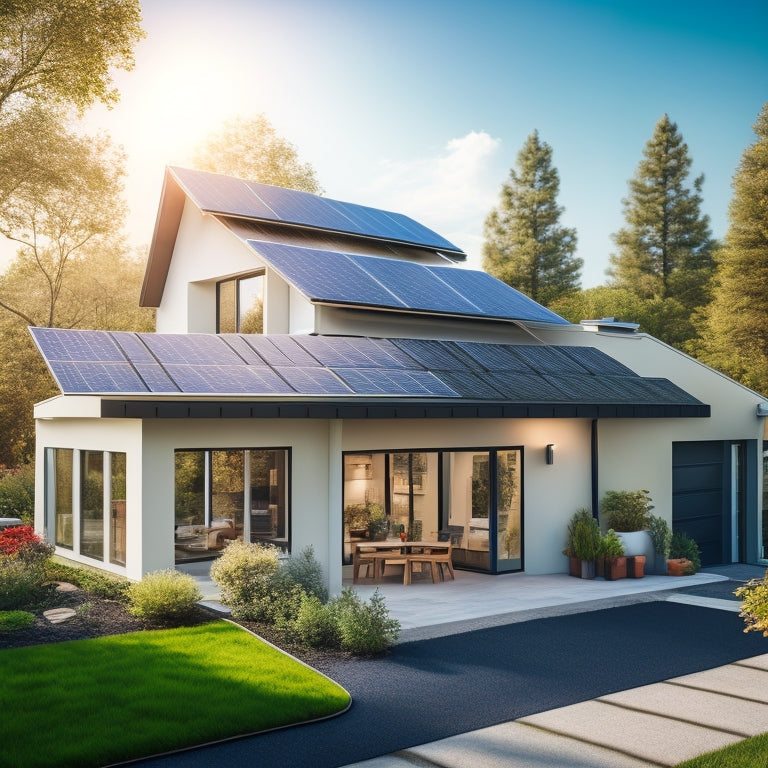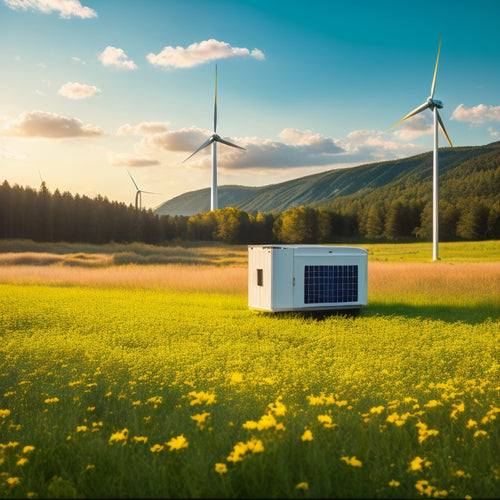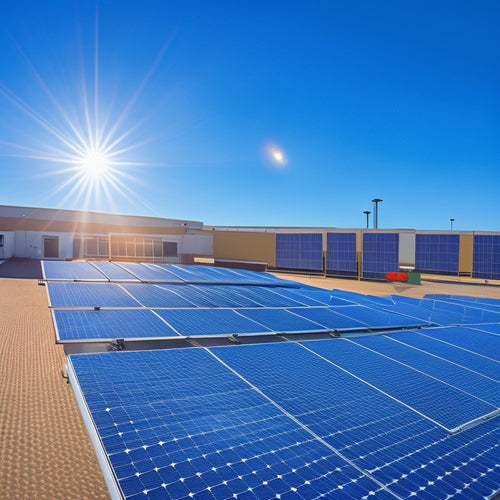
Best Home Energy Storage Options
Share
When considering the best home energy storage options, focus on solutions that enhance energy independence and employ renewable sources effectively. Lithium-ion batteries are popular due to their high energy density and longer lifespan compared to lead-acid alternatives. Assess your energy usage patterns to determine necessary storage capacity, ensuring you capture surplus solar energy for nighttime use. This can drastically cut down your utility bills and provide backup during outages. Additionally, investigate government incentives that can offset initial costs. There's more to discover about optimizing your energy strategy and enhancing overall efficiency.
At a Glance
- Lithium-ion batteries are the most popular choice for home energy storage due to their high energy density and longer lifespan compared to lead-acid batteries.
- Combining solar panels with energy storage systems maximizes renewable energy utilization and enhances energy independence, reducing reliance on the grid.
- Assess your energy needs and identify peak usage times to determine the appropriate storage capacity for your household.
- Consider government incentives like tax credits and rebates, which can significantly offset the initial costs of home energy storage solutions.
- Smart technology in energy storage systems can optimize energy usage patterns, leading to lower utility costs and improved energy management.
Energy Independence and Savings
When you invest in home energy storage, you're not just enhancing your energy independence; you're also releasing significant financial benefits.
By implementing energy storage solutions, you can capture and store excess solar energy for later use, allowing you to power your home at night and during peak usage times.
By reducing reliance on the grid, you can lower your monthly utility bills and potentially eliminate costs during peak pricing periods.
Additionally, embracing off-grid living can offer long-term savings and resilience against fluctuating energy prices.
Reliable backup power guarantees you maintain comfort and connectivity at all times.
Financial Benefits Overview
Investing in home energy storage solutions offers considerable financial benefits, particularly regarding energy independence and long-term savings. By integrating a battery storage system with your solar panels, you can store excess energy produced during the day for use at night or during peak hours. This reduces your reliance on the grid, effectively lowering your utility bills.
While the initial investment for these systems can be substantial, many homeowners find that government incentives can greatly offset these costs. Tax credits, rebates, and financing options help make the shift more manageable, allowing you to recoup your investment faster. Over time, the savings on your electricity bills and the potential for energy price fluctuations mean you could achieve considerable savings.
Moreover, energy independence shields you from rising energy costs and outages, giving you greater control over your energy consumption. The financial environment of home energy storage continues to evolve, making it an increasingly viable option for those seeking autonomy in their energy choices.
Ultimately, the combination of reduced utility expenses and government incentives can lead to a strong return on investment, reinforcing the value of adopting energy storage solutions.
Off-Grid Living Advantages
Choosing to live off-grid enhances your energy independence and can lead to notable savings over time. By investing in off-grid systems, you're not just breaking free from utility dependence; you're actively engaging in sustainable practices that benefit both your wallet and the environment.
These systems often include solar panels, wind turbines, and energy storage solutions that allow you to generate and store your own energy. With the right technology, you can minimize your reliance on traditional power sources, which often come with fluctuating costs.
By utilizing renewable energy, you stabilize your energy expenses and greatly reduce or eliminate your monthly utility bills. This shift not only promotes financial savings but also aligns with a growing movement towards sustainability, ensuring a smaller carbon footprint.
Additionally, living off-grid enables you to take control of your energy usage. You'll become more mindful of your consumption patterns, leading to further efficiency and savings.
Ultimately, the choice to adopt off-grid living with efficient energy storage options positions you for greater autonomy and resilience, clearing the path for a sustainable future that prioritizes freedom and independence.
Increased Renewable Energy Utilization
As you consider home energy storage options, integrating solar energy becomes a crucial strategy for maximizing your renewable energy utilization.
By storing excess solar power, you not only enhance your energy independence but also contribute to a more resilient grid. This approach allows you to utilize renewable sources effectively, reducing reliance on traditional energy systems.
Additionally, regular monitoring and software updates can greatly impact battery performance, ensuring peak efficiency in your energy storage solutions.
Understanding energy needs for peak performance is essential for making informed decisions in this area.
Solar Energy Integration
Integrating solar energy into your home energy storage system greatly improves the usage of renewable resources. By capturing the power of the sun, you can greatly reduce your reliance on non-renewable energy sources.
One crucial aspect to contemplate is solar panel compatibility. Confirm that your solar panels are designed to work efficiently with your chosen energy storage system. This compatibility maximizes energy capture and storage, allowing you to make use of solar energy effectively throughout the day and night.
Installation considerations are crucial as well. Proper placement of solar panels can optimize sunlight exposure, influencing your energy production.
Take into account your roof's orientation, shading from trees or buildings, and local climate conditions. Additionally, you'll need to evaluate the storage capacity required to meet your household's energy needs, particularly during times of low solar production.
Grid Independence Benefits
Achieving grid independence through home energy storage systems not only enhances your energy security but also markedly increases the utilization of renewable resources. By storing excess energy generated from solar panels or wind turbines, you gain the flexibility to use this energy when it's most beneficial, reducing reliance on fossil fuels and the grid. This self-sufficiency promotes energy autonomy, allowing you to utilize green energy effectively.
When you incorporate a home energy storage system, you're actively contributing to grid resilience. During peak demand times or grid outages, your stored energy can support your home, helping to stabilize the grid. This capability not only benefits you but also enhances the overall efficiency of the energy system.
Moreover, increased renewable energy utilization encourages a cleaner environment, aligning with your desire for freedom from conventional energy sources. By optimizing your energy consumption, you lessen the strain on the grid, creating a sustainable future.
Fundamentally, embracing home energy storage is more than a personal choice; it's a powerful step toward a greener, more resilient energy environment.
Battery Capacity and Lifespan
When considering home energy storage, understanding battery capacity is vital since it directly impacts how much energy you can store and use.
Factors such as temperature, charge cycles, and usage patterns play significant roles in determining a battery's lifespan, and maintaining ideal conditions is critical for performance.
For instance, implementing effective maintenance practices for solar batteries can prevent premature degradation and guarantee longevity.
Understanding Battery Capacity
Understanding battery capacity is vital for maximizing the efficiency and longevity of your home energy storage system. Battery capacity, typically measured in kilowatt-hours (kWh), indicates how much energy a storage system can hold, directly affecting your ability to use renewable energy sources like solar power.
Different battery chemistries, such as lithium-ion, lead-acid, or flow batteries, offer varying capacities and performance characteristics. Selecting the right storage technology is essential for meeting your energy needs while ensuring peak efficiency.
Lithium-ion batteries, for instance, generally provide higher energy density and longer cycle life compared to lead-acid options. This means they can store more energy and last longer, allowing you to utilize renewable sources effectively.
When evaluating battery capacity, consider both the total energy storage and the rate at which energy can be drawn from the system. A higher discharge rate may be necessary for high-demand applications, while a lower rate might suffice for basic needs.
Factors Affecting Lifespan
Battery capacity plays a significant role in determining the lifespan of your home energy storage system. Understanding the interplay between various factors can help you maximize your investment. Different battery chemistries exhibit unique degradation rates based on temperature effects, usage cycles, and environmental factors.
Here's a quick reference table to highlight key aspects affecting lifespan:
| Factor | Description | Impact on Lifespan |
|---|---|---|
| Battery Chemistry | Lithium-ion vs. lead-acid | Different degradation rates |
| Temperature Effects | Extreme heat or cold | Accelerates wear |
| Maintenance Practices | Regular checks and cleaning | Prolongs battery life |
| Usage Patterns | Daily cycling vs. infrequent use | Influences degradation |
| Installation Quality | Proper setup and connections | Affects efficiency |
Your charging habits also play an important role. Frequent overcharging or deep discharges can drastically reduce lifespan. Make sure you adhere to manufacturer warranty guidelines and best practices to maintain peak performance. By considering these factors, you can enhance the longevity of your energy storage system, guaranteeing your freedom from energy constraints.
Assess Your Energy Usage
To optimize your home energy storage system, start by identifying your peak usage times throughout the day. This helps in understanding when your energy demands are highest and allows for better planning.
Conducting an energy audit can also provide useful revelations into your consumption patterns. Next, calculate your average daily consumption to determine the appropriate storage capacity needed to meet your energy needs effectively.
Identify Peak Usage Times
Identifying your peak energy usage times is crucial for maximizing the benefits of home energy storage systems. By understanding your specific usage patterns, you can strategically store energy when demand is low and harness it during peak demand periods. This approach not only improves your energy independence but also potentially reduces your energy costs.
Implementing energy monitoring tools allows you to track your consumption more accurately. These systems can provide real-time data on your energy usage, helping you identify when your peak times occur. Most homeowners experience higher demand during the early morning and evening hours when appliances like HVAC systems, refrigerators, and electronics are in heavy use.
Knowing your time of use helps you adjust your habits accordingly. You can schedule high-energy tasks, such as laundry or dishwashing, during off-peak hours when electricity rates are lower.
This proactive approach guarantees that your home energy storage system operates at its most efficient level, storing energy when it's abundant and releasing it during peak demand. Ultimately, this knowledge enables you to take control of your energy consumption and improves your overall energy strategy.
Calculate Average Daily Consumption
Calculating your average daily energy consumption is essential for understanding your overall energy needs and optimizing your home energy storage system. To start, conduct an energy audit. This process involves examining your energy bills, appliance wattage, and usage patterns over a typical week or month. By doing this, you'll identify your consumption patterns, allowing you to pinpoint peak usage times and adjust your habits accordingly.
Next, gather data on each appliance's energy consumption. For example, if your refrigerator uses 150 kWh per month, divide that by 30 to find its daily consumption. Repeat this for all major appliances, including heating and cooling systems, lighting, and electronics.
Add these daily figures together to calculate your total average daily consumption.
Once you have this number, you can assess how much energy storage you'll need. This knowledge enables you to choose an appropriate home energy storage solution that aligns with your consumption patterns. By understanding your energy usage, you can maximize efficiency, reduce waste, and ultimately achieve greater independence from the grid.
This proactive approach not only enhances your energy management but also supports your desire for freedom in energy choices.
Lower Long-Term Costs
Investing in home energy storage systems can greatly reduce your utility bills over time.
By storing excess energy generated during peak production periods, you can use it during peak demand times when rates are higher.
This strategic management of energy not only enhances efficiency but also leads to substantial long-term savings.
Reduced Utility Bills
Home energy storage systems offer an engaging way to reduce utility bills and achieve lower long-term costs. By storing excess energy generated during off-peak hours, you can utilize this stored energy during peak demand times when utility rates are typically higher. This strategic approach directly addresses utility rate fluctuations, allowing you to minimize your dependence on the grid and its unpredictable pricing.
Incorporating energy efficiency upgrades enhances the effectiveness of your storage system. By improving your home's overall energy efficiency—such as installing LED lighting, high-efficiency appliances, and proper insulation—you lower your overall energy consumption. This means you'll rely less on your energy storage system and reduce the amount of energy you need to purchase from your utility provider.
Moreover, many energy storage solutions come with smart technology that optimizes your energy usage patterns, ensuring that you're not only saving money but also maximizing your energy independence.
Frequently Asked Questions
What Are the Environmental Impacts of Home Energy Storage Systems?
Home energy storage systems have varying environmental impacts. Conducting a lifecycle assessment reveals resource use and emissions, while effective battery recycling reduces waste and conserves materials, emphasizing the importance of sustainability in your energy choices.
How Do I Choose the Right Size for My Energy Storage System?
To choose the right size for your energy storage system, calculate your capacity based on daily energy needs. Assess usage patterns, peak demand, and future expansion plans to guarantee peak performance and energy independence.
Are There Any Government Incentives for Installing Energy Storage?
You might find government incentives for energy storage feel like a wealth of resources. Federal tax credits and state rebates can greatly reduce costs, making your investment even more appealing while promoting your energy independence and sustainability goals.
Can I Use Energy Storage During Power Outages?
Yes, you can use energy storage during power outages. This provides power outage benefits, ensuring energy independence. By utilizing stored energy, you maintain control over your electricity needs, enhancing your resilience against grid disruptions.
What Maintenance Is Required for Home Energy Storage Systems?
Maintaining your energy storage system involves monitoring battery lifespan, ensuring system efficiency, and conducting regular inspections. You'll need to check connections, update software, and clean components, all to maximize performance and extend longevity.
Explore More
In choosing the best home energy storage option, you're balancing immediate costs with long-term savings. While investing in a high-capacity battery might seem intimidating, it can lead to energy independence and reduced bills over time. Juxtaposing the short-term expense against future benefits highlights the value of renewable energy utilization. By evaluating your energy usage, you can make informed decisions that not only enhance your home's efficiency but also contribute positively to the environment.
Related Posts
-

Is This the Future of Alternative Energy Systems
Yes, alternative energy systems are shaping the future of energy. Innovations in solar and wind technologies are driv...
-

Sustainable and Eco-Friendly Generators for a Reduced Carbon Footprint
Sustainable and eco-friendly generators are perfect for cutting your carbon footprint and increasing energy efficienc...
-

Essential Solar Panel Mounts for Commercial Properties
When it comes to essential solar panel mounts for your commercial property, durability and wind resistance are key fa...


